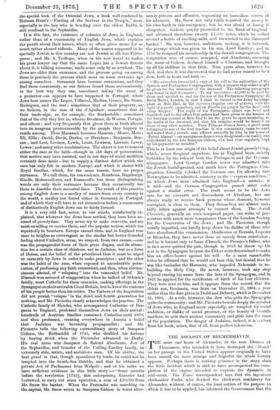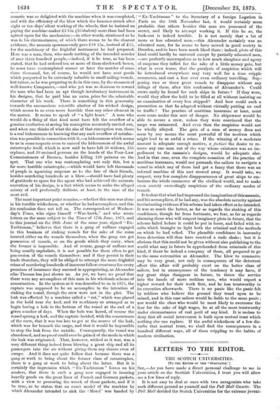THE ASSASSIN OF BREMERHAVEN.
THE more one hears of Alexander, as the man Thomas or- Thomaasen, who intended to have destroyed the 'Mosel' on her passage to the United States, appears originally to have been named, the more strange and frightful the whole histo& appears. Perhaps there is nothing grimmer in the story than. the little incident which is said to have accompanied the com- pletion of the engine intended to explode the dynamite in mid-ocean. The Times' correspondent says that the ingenious clockinaker Fuchs, who devised the clockwork machinery for Alexander, without, of course, the least notion of the purpose to which it was to be applied, has informed the Government that the assassin was so delighted with the machine when it was completed, and with the efficiency of the blow which the hammer struck after eight or ten days' silent working of the wheels, that he insisted on paying the machine-maker £315s. (25 thalers) more than had been agreed upon for the mechanism ;—in other words, straitened as he was in his circumstances, of which there seems to be the clearest evidence, the assassin spontaneously gave £18 158., instead of £15, for the machinery of the frightful instrument he had prepared. Here was a man, then, who made nothing of the intended murder of over three hundred people,—indeed, if it be true, as has been stated, that he had ordered ten or more of these clockwork boxes, he must have contemplated sooner or later the murder of some three thousand, for, of course, he would not have sent goods which purported to be extremely valuable in small sailing-vessels, but rather, as he was preparing to do in this case, by the steamers of well-known Companies,—and who yet was so desirous to reward the man who had been an apt though involuntary instrument in his designs, that he paid him an extra price for the admirable character of his work. There is something in this generosity towards the unconscious scientific abettor of his wicked design, which seems to us even more horrible than any other element in the matter. It seems to speak of "a light heart." A man who would do a thing of that kind must have felt the overflow of a genuine exultation at seeing his conception accurately carried out, and when one thinks of what the aim of that conception was, there is a real hideousness in knowing that any such overflow of satisfac- tion was possible in connection with it,—a hideousness which seems to us in some respects even to exceed the hideousness of the awful catastrophe itself, which is now said to have left 56 widows, 135 orphans, and 20 maimed persons on the hands of the Poor-Law Commissioners of Bremen, besides killing 128 persons on the spot. That one who was contemplating not only this, but a far more horrible catastrophe,—which would have left thousands of people in agonising suspense as to the fate of their friends, besides murdering hundreds at a blow,—should have had plenty of gratitude to spare for the agent who had achieved the accurate execution of his design, is a fact which seems to make the alleged misery of evil profoundly dubious, at least, in the case of the most evil.
The most important point remains,—whether this man was alone in his terrible wickedness, or whether he had accomplices, and this his confession does not tell us. The correspondent of Wednes- day's Times, who signs himself " War-hawk," and who wrote letters on the same subject to the Times of 17th June, 1873, and to this journal on the 28th June of the same year, signed "Ex- Yachtsman," believes that there is a gang of ruffians engaged in this business of sinking vessels for the sake of the sums insured either on the vessels themselves, when the gang can get possession of vessels, or on the goods which they carry, when the former is impossible. And of course, gangs of ruffians not being usually capitalists, it is not possible for them often to get possession of the vessels themselves; and if they persist in their trade therefore, they will be obliged to attempt the more frightful crime of murdering hundreds of innocentfellow-creatures for every premium of insurance they succeed in appropriating, as Alexander alias Thomas has just shown us. As yet, we have no proof that there were any accomplices of this man in his wholesale scheme of assassination. In the system as it was described to us in 1873, the captain was supposed to be an accomplice in the intention of sinking the vessel, though the crew were not in the plot. The leak was effected by a machine called a " rat," which was placed in the hold near the keel, and its machinery so arranged as to begin boring a hole in the bottom of the vessel at the end of a given number of days. When the hole was bored, of course the vessel sprung a leak, and the captain decided, with the concurrence of the crew, that it was too late to get at the source of the leak, which was far beneath the cargo, and that it would be impossible to stop the leak from the outside. Consequently, the vessel was abandoned, and no proof could ever be gained of the mode in which the leak was originated. That, however, wicked as it was, was a very different thing indeed from blowing a great ship and all its passengers into the air without giving them any chance even of escape. And it does not quite follow that because there was a gang at work to bring about the former class of catastrophes, there is a gang at work to bring about the latter. But it is certainly the impression which " Ex-Yachtsman " leaves on his readers, that there is such a gang now engaged in insuring heavily goods on the great lines of French and German packets, with a view to procuring the wreck of those packets, and if it be true, as he states, that an exact model of the machine by which Alexander intended to sink the ' Mosel' was handed by " Ex-Yachtsman " to the Secretary of a foreign Legation in Paris on the 18th November last, it would certainly seem probable that others besides this man are possessed of the secret, and likely to attempt working it. If this be so, the look-out is indeed terrible. It is not merely that a lot of more or less educated men,—this Alexander certainly was an educated man, for he seems to have moved in good society in Dresden, and to have been much liked there ; indeed, plots of this kind could hardly be matured except by partially educated men, —are perfectly unscrupulous as to how much slaughter and agony of suspense they inflict for the sake of a little money gain, but what is even worse, that the paralysis of suspicion which will be introduced everywhere may very well for a time cripple commerce, and cast a fear over even ordinary travelling. Sup- posing two or three great vessels to disappear without any tidings of them, after this confession of Alexander's. Could crews easily be found for such ships in future ? If they were, would they allow the hold to be filled at all without insisting on an examination of every box shipped? And how could such a precaution as that be adopted without virtually putting an end to traffic ? The practice of maritime insurance at least, must soon cease under this sort of danger. No shipowner would be able to secure a crew, unless they were convinced that the cargo was uninsured. And even then the suspicion would not be wholly allayed. The gain of a sum of money does not seem by any means the most powerful of the motives which might lead to so awful a crime. If the winning of a moderate amount is adequate enough motive, a fortiori the desire to re- move any one man out of the way whose existence was an im- pediment to the assassin's designs, would be adequate also. And in that case, even the complete cessation of the practice of maritime insurance, would not persuade the sailors to navigate a vessel in which any of them had got a fancy that there was an infernal machine of this sort stowed away. It would take, we suspect, very few complete disappearances of great ships to em- barrass the whole commerce of the civilised world, and to make even society exceedingly suspicious of the ordinary modes of transit.
It is clear that what had impressed the imagination of this assassin, and his accomplices, if he had any, was the absolute security against incriminating evidence if his scheme had taken effect as he intended. It was so much the better, as far as regards the shaking of this confidence, though far from fortunate, we fear, as far as regards alarming those who will suspect imaginary plots in future, that the scheme failed before it could be put in force, and failed with re- sults which brought to light both the criminal and the methods on which lie had relied. The plausible confidence in immunity from detection will thus have received a rude shake; but it is obvious that this could not be given without also publishing to the world what may in future be apprehended from criminals of this kind, if there be indeed a company of them, all prepared to go to the same extremities as Alexander. The blow to commerce may be very great, not only in consequence of the deterrent effect this affair will probably exert on the better class of sailors, but in consequence of the tendency it may have, if any great ships disappear in future, to throw the service into the hands of more reckless men, who would expect a higher reward for their work first, and be less trustworthy in its execution afterwards. There is no panic like the panic felt by soldiers who believe the ground they tread upon to be mined, and in this case sailors would be liable to the same panic ; nor would the class who would be most likely to overcome the fear for the sake of high wages, be at all the most trustworthy under circumstances of real peril of any kind. It is useless to deny that all social intercourse is built upon mutual trust which nothing else can replace. If the awful wickedness of a few dis- turbs that mutual trust, we shall find the consequences in a hundred different ways, all of them crippling to the habits of modern civilisation.



































 Previous page
Previous page